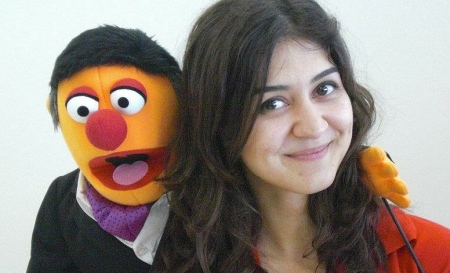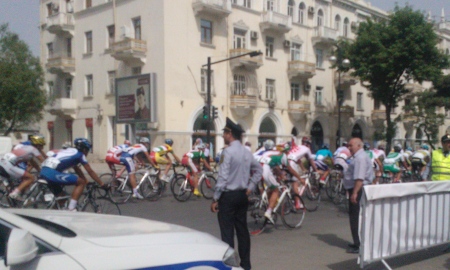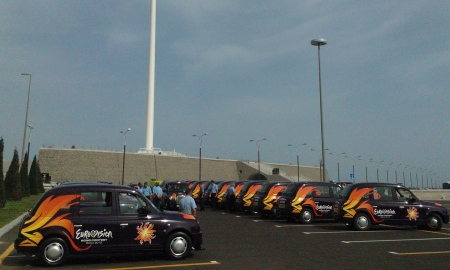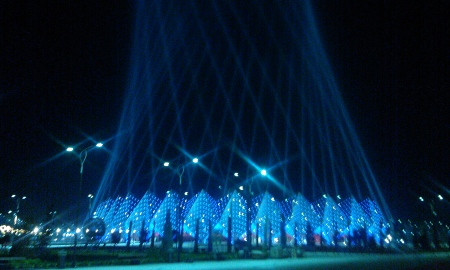As the 2012 Eurovision Song Contest fades from view, and thoughts turn to the next Contest, what will people take away from Azerbaijan’s hosting of the Eurovision? The ESC Insight team have sat down to think about the moments that made Baku a memorable Contest.
Anyone following this year’s Eurovision will know that there was a huge amount of discussion about the political situation within Azerbaijan, and that was reflected with some serious international press coverage before and during the Contest. This is why Eurovision going to Azerbaijan was a good thing. Those discussions in the NGOs and media would likely not have happened with the same ferocity if the Song Contest’s spotlight had not cast a light over the country.
One of the original goals of Eurovision was to allow all the countries entering the Contest to learn a little more about each other, and that idea is just as strong in 2012 as it was in 1956.
For all that talk, the people on the ground welcomed the Eurovision invasion with open arms, even if the taxi drivers never knew how to find ‘Flag Square’ or ‘Euroclub’, even after two weeks. From the first moments of landing at Heydar Aliyev Airport and having to ask one of the volunteers to call our hotel to check where the airport transfer was, to trying to herd every website that had an irrational desire to be the first to interview ‘Poor Tony’ from Mandinga, they were the oil that kept Eurovision running (at least for the ESC Insight team)… it would be fabulous to see some of them at another Eurovision where they can just enjoy themselves.

Terry and Nigar
Then there was Sunday, Day Four of the Heydar Aliyev Anniversary Cycle Tour. Running through the centre of Baku, shutting down almost every single road, what should have been a twenty-minute taxi ride from our hotel turned into a two-hour tour of the back streets and outlying districts of Baku.
The smart thing would have been for our taxi driver to mention to the Police that we were Press (that’s what the crafty folks in EscXtra’s cab, just in front of ours, managed). But no, there’s no talking back to authorities here, so instead of heading south, we were pushed into a traffic jam roaring north. A lot. The back streets of Baku, where the building work is not on impressive hotels but on modest blocks of flats, where you can point out the local butcher’s shop by spotting the nervous-looking sheep standing out front, where the demarcation between the shore line and the rest of the city is clear.
If nothing else, it showed us more of Baku, the city of contrasts.

Cycling through Baku
Probably our favourite moment of confusion came a few days later. After the ‘Taxi Ride of Enormous Distance’ (total cost 14 euros), we hitched a lift with the stage hands and techies from Brainpool, who were also sharing our hotel. That worked out quite well as we would be dropped off behind the Crystal Hall, and could walk around the peninsula to the Press Centre while playing our daily game of “spot the difference” – maybe a new fence, a line of trees, or a dirt track that has been paved overnight. Then we came to the strip of concrete we could not pass.
The rationale was simple, it was a checkpoint that was not meant to let through those with press accreditation. About twenty feet in front of it was another checkpoint, again that was not meant to let through the press. Just beyond that was the Press Centre, where we could go. But this twenty-foot strip of concrete was a no-go area. We could not pass.
Nor could we go back. Next to the bus drop off point was a checkpoint. That wouldn’t let us through.
The next day we crossed our fingers and took a taxi again.

Taxi Drivers wondering where Flag Square is...
Like any capital city, Baku knows how to project the image it wants. It’s projected on every flat surface on the waterfront, it’s on show with every building edged in neon, it’s displayed via the impressive animations on the side of the Flame Towers, it’s thrown into the sky from the Television tower. Baku reminds me of an adolescent who has decided to try out every single possible fashion, all at the same time.
The Crystal Hall was no exception. The idea of the flags being shown on the side of the stadium before each song might have seemed a bit tacky and overblown on television, but it fits in with the rest of the shoreline, as did the searchlights fashioning the crystal-esque decanter with the Hall as the base. The sights of Baku are as striking a memory as The Strip in Las Vegas… and just as bright.
Then there was this strange big glowing ball of fire in the sky.
This was the first Eurovision in a long time that the sun-worshipers could enjoy. Yes there was the hilarity of spotting who forgot to bring sun-block (Michael…) but the temptation to move the desks out of the press room and into the sunshine was incredibly high. Whilst the time difference played havoc with many body clocks, the sunshine and bright weather certainly helped to clear away the mental cobwebs… and perhaps the occasional hangover.

The Crystal Hall's spotlights
But while the setting for Eurovision changes every year, there’s one thing that always stays constant – the wonderful people who are attracted to the Contest. We’ve already mentioned the volunteers helping out in the Press Centre, but one of the joys of Eurovision is how everyone just gets on and enjoys the company. Yes there are lines between websites, but on the whole this blurs away, and we become one big family all enjoying the Contest, writing up rehearsals, talking about the performances, trying to work out who we think will, and running around getting interviews with the performers.
After Loreen’s victory, we’re off to Sweden. Whether it is held in Stockholm, Malmo, Gothenberg, or Helsingborg, the biggest draw is not the chance to visit another county, to stay somewhere new and discover another culture – even though that’s all true – the biggest draw is the humanity that is drawn from all over the world.
It’s a Song Contest, but it’s more than a contest. It’s about people, it’s about enjoying the differences between cultures, it’s about sharing in the joy and happiness that music can bring.
And just maybe, after two weeks, helping people all over the world understand just a little bit more about each other.









It’s a shame that the majority much of said music is a bit rubbish. 😛
In all seriousness though, that photo of the Crystal Hall in blue looks truly spectacular.
I liked the idea of the flags on the buildings, think they had to work on it a bit better though. Most of the time the colours were just in order, and not really in the design of the flag. For example, Turkey just had a red block, San marino, greece, cyprus, were just 2 colours etc. I thought for UK they would just use a selection of Red White and Blue in a seemingly random order, but they actually did a pretty good job of making a union jack, and it was the only time the colours went diagonal and actually made a design rather than just a block of colour.
I’m going to be a devils advocate a bit, cause no one is really saying it and someone really should. There is a lot of talk about the political environment in Azerbaijan and how repressed the people are etc. Yet, all countries except Poland and Armenia attended the song contest in this country. Not one of them had the guts to say ‘No, Azerbaijan has a bad human rights record, we will not be sending a contestant to that country.’ Doesn’t that make them a bit of a hypocrite to say yes to sending people to the country for a light entertainment contest and then playing the documentaries about the state of the nation? (SBS showed that show only a few days ago.)
I was in the Eurovision bubble for a few years in the 90s. It’s sort of like going to the movies. You sit dazzled for a few hours, then it’s back to reality.